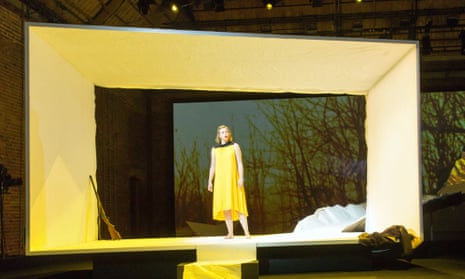One of the artists-in-residence at this year’s Aldeburgh festival is Thomas Larcher. The 55-year-old Austrian features as composer and pianist, and the festival was launched with the UK premiere of his opera, Das Jagdgewehr (The Hunting Gun), which was first performed at the Bregenz festival last summer. With a libretto by Friederike Gösweiner, based on a novella of the same name by Yasushi Inoue, it’s a quietly intense domestic drama set in postwar Japan, played out in a single 100-minute span.
A poet observes a lonely man hunting in a wintry landscape, and writes a poem about his apparent loneliness. Some time later, he receives a letter from someone who identifies himself as the solitary hunter, Josuke Misugi, and who encloses three further letters that explain the reason for his sad isolation. The letters come from his wife, Midori, asking him for a divorce, his lover Saiko (who is Midori’s cousin and best friend) telling him she is going to kill herself because their affair has been discovered, and from Saiko’s daughter, Shoko, who is appalled to learn of the affair.

The opera then revisits the events described in the letters up to Saiko’s suicide, and to Midori’s revelation that she knew of the affair all along. But it is all rather one-paced, and presented with dream-like detachment, as if dredged out of collective memory. That’s despite the expressive beauty of Larcher’s vocal lines, which include some terrifyingly high writing for Shoko, and the striking detail in the ensemble writing, with luminous textures that shatter into icy shards, and contributions from an off-stage chorus woven in and out of them.
The spare production by Karl Markovics is taken over from Bregenz last year, with two of the cast – Giulia Peri as Midori and Sarah Aristidou as Shoko – repeating their roles. They are joined by Iris van Wijnen as Saiko, Peter Schöne as the icy Misugi and Samuel Boden as the unnamed poet; Exaudi supply the off-stage voices. It is all wonderfully secure under Ryan Wigglesworth as conductor, and the production sees the debut of the Knussen Chamber Orchestra, created in memory of the composer who was so closely identified with Aldeburgh and conducted his last concerts there a year ago.
At Snape Maltings, Aldeburgh, on 9 June. The Aldeburgh festival runs until 23 June.

Comments (…)
Sign in or create your Guardian account to join the discussion